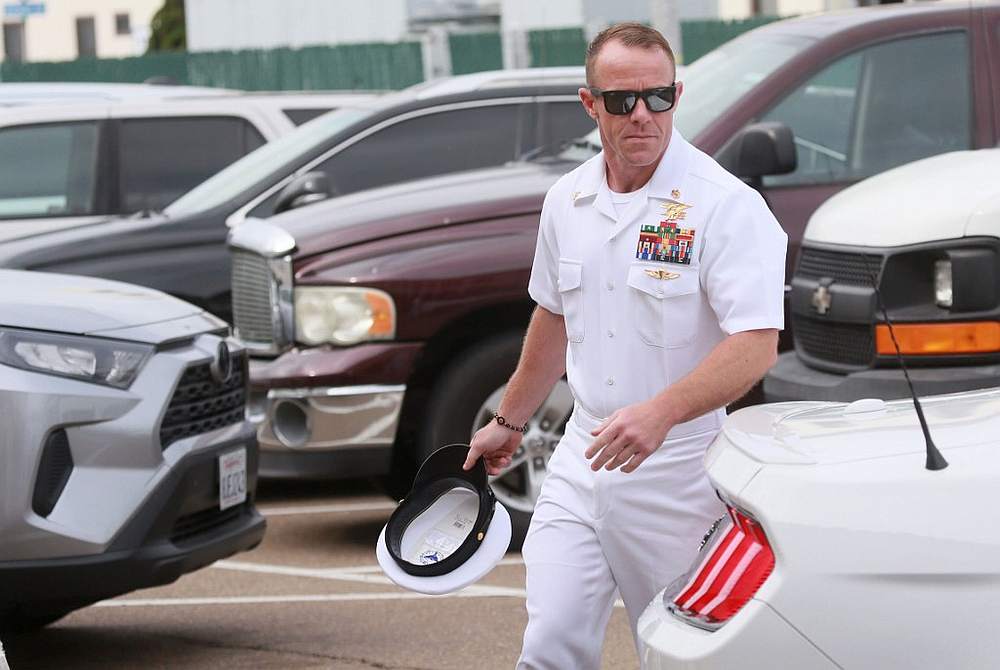WASHINGTON, Nov 25 — President Donald Trump ordered the Pentagon to let a Navy SEAL convicted of battlefield misconduct keep his Trident pin designating him as a member of the elite force, instead of holding a review board, his defence secretary said yesterday.
The disclosure by Mark Esper illustrates how Trump intervened repeatedly in the case of Special Operations Chief Edward Gallagher, who was acquitted by a military jury of murdering a captured Islamic State fighter in Iraq, but convicted of posing with the detainee's corpse.
After restoring Gallagher's rank on November 15, Trump on Sunday gave a formal order to halt the military's plans to hold a review board, Esper said.
“I spoke with the president on Sunday. He gave me the order that Eddie Gallagher will retain his Trident pin,” Esper told reporters at the Pentagon, referring to Special Operations Chief Edward Gallagher.
Esper said he had been in favour of following the regular processes but stressed that, as president, Trump had “every right, authority and privilege to do what he wants to do.”
Gallagher's case had been championed by conservative commentators, who argued he had been treated unfairly. Trump restored his rank earlier this month, when he also pardoned two Army officers accused of war crimes in Afghanistan.
Critics had said such actions would undermine military justice and send a message that battlefield atrocities will be tolerated.
Esper's comments were his first since he fired Navy Secretary Richard Spencer on Sunday over his handling of Gallagher case.
Esper gave new detail about why he fired Spencer, saying the Navy chief had sought to cut a side deal with the White House that was “contrary to what we had agreed to and contrary to Secretary Spencer's public position” — in which he appeared to favour allowing the military justice process to go ahead.
“We learned that several days prior, Secretary Spencer had proposed a deal whereby if the president allowed the Navy to handle the case, he would guarantee that Eddie Gallagher would be restored to rank, allowed to retain his Trident and permitted to retire,” Esper said.
Caught off-guard
Esper said he and Army General Mark Milley, chairman of the Joint Chiefs of Staff, had been completely caught off guard by Spencer. The Navy secretary, Esper said, had undermined everything Pentagon leadership had been collectively discussing with Trump.
Esper called Spencer and said he “was completely forthright in admitting what had been going on.” Esper asked for Spencer's resignation letter on Sunday.
Esper's remarks contradicted what had appeared to be a principled stand by Spencer, laid out in his letter that suggested a split with Trump over the need to uphold the rule of law.
US Senator Tim Kaine, a Democrat on the Senate Armed Services Committee, suggested he still had questions about what happened to Spencer, who he called “a good man, a patriotic American and an effective leader.”
“We have many unanswered questions about Secretary Spencer’s departure. The Senate Armed Services Committee must fully investigate what happened to ensure accountability,” Kaine said.
Spencer's letter, seen by Reuters, took parting shots at Trump and defended the need to preserve “good order and discipline throughout the ranks” — something Navy officials had believed the peer review board would help ensure.
“The rule of law is what sets us apart from our adversaries,” Spencer wrote.
“Unfortunately it has become apparent that in this respect, I no longer share the same understanding with the Commander in Chief who appointed me.”
Milley said yesterday that as far as he was concerned the Gallagher case was now closed.
“As far as I'm concerned, it is case closed now and it is time to move on and address the national security of the United States,” Milley, the top US military officer, told a small group of reporters during a trip to the Middle East. — Reuters






















